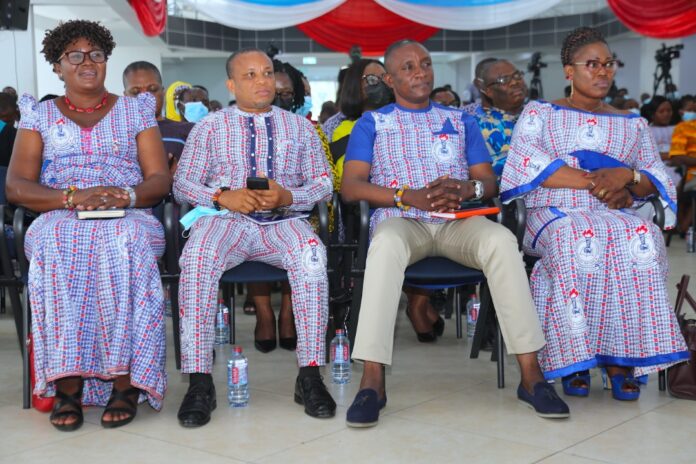Speakers at an investment forum organised by the Ghana National Association of Teachers (GNAT) have called on government to take a serious look at the meagre salaries public sector workers currently receive.
It came out that the Ghanaian workers’ salary as a percentage of per capita Gross Domestic Products (GDP) is 0.5% and is the lowest on the continent.
The income per capita is another measure for global prosperity analysis, though it is less broadly used.
It was established that this situation has an adverse effect on the number of people who subscribe to pensions schemes in the country.
General Secretary of GNAT, Thomas Musah, said any public sector worker in Ghana should be able to retire into a 2-bedroom house which is currently not the case.
He also reiterated calls for the payment of the Cost of Living Allowance (COLA), which various labour organisations have been clamouring for in view of the rising cost of living currently being experienced in the country.
An economist Professor Godfred Bokpin, has made the case for the Ghanaian worker to be paid better.
He stated that “the Ghanaian worker deserves more than we have right now.”
Currently, in Ghana, about 33.3% of the population contributes to the Social Security and National Insurance Trust (SSNIT) pension scheme, a situation he believes can be improved.
Prof Bokpin disclosed that a whopping 70.1% of Ghanaian workers are without formal work rights.
This, he noted will have an effect on the long-term sustainability of the SSNIT scheme as it needs a huge amount of regular contributors to keep going.
He also holds the view that returns on investments in recent years (2015-2019) have not boded well for the sustainability of the SSNIT pension scheme.
The professor of economics said, joining SSNIT for most people is a debt trap arguing that the most vulnerable people in the current inflationary economy are pensioners.
Prof Bokpin postulated that SSNIT could have positioned itself to drive infrastructure in the country, as is being done elsewhere since they have access to long-term financing.
He criticised some of the past investment decisions, saying, SSNIT engaged in some bad investments that Non-governmental Organisations will not venture into.
In a sharp rebuttal, the Director-General of SSNIT, Dr John Ofori-Tenkorang disagreed with Prof Bokpin’s assertions, insisting that SSNIT’s benefits far outstrip any that rival funds and investments offer.
He said that as part of efforts to get more people on board and paying their SSNIT contributions, the Trust has embarked on an education drive to engage persons who are in the formal sector or are self-employed to get them to understand why they ought to take advantage of the SSNIT scheme.
He said, “we’ve done so by engaging unions like the Ghana Private Road Transport Union (GPRTU) and the hairdressers association, and many others, which recently culminated with us meeting the clergy, and trying to get the churches sensitised to know that the SSNIT scheme is good for their employees, and the congregation at large.”
Dr Ofori-Tenkorang disclosed that SSNIT will soon roll out an easy onboarding system that will allow prospective contributors to use their Ghana card details to register onto the SSNIT system.
He also disclosed that SSNIT’s contributors will soon be able to pay their contributions using various payment platforms from the comfort of their homes and offices.
He was optimistic about the future prospects of the schemes.‘
The pension industry is growing fast because when the new dispensation was started in 2010, assets under pension management were around GH₵5.5 billion.
Within 12 years the figure had risen to GH₵40 billion.
Deputy Minister of Employment and Labour Relations, Bright Wireko Brobbey, assured the teachers that his Ministry has not reneged on the issue of COLA, but was only anticipating a meeting with the umbrella body to come to a concrete decision on it.
He commended public sector workers for their role in keeping the Ghanaian economy afloat.













































